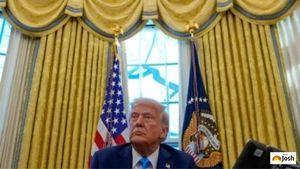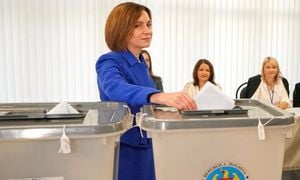Pavel Durov, the enigmatic founder of Telegram, has made a startling revelation: he believes he survived a poisoning attempt in the spring of 2018, a period marked by intense pressure from government authorities and high-stakes business moves. The story, which Durov shared for the first time in a recent interview with podcaster Lex Fridman, has sent ripples across the tech and political worlds, raising new questions about the risks faced by outspoken entrepreneurs operating at the intersection of technology and politics.
According to The Moscow Times and other sources, Durov recounted a harrowing episode that unfolded shortly after he returned to his rented townhouse one evening. He noticed something unusual left near his door by what he described as a "strange neighbor." Within an hour, he began to feel unwell. As he told Fridman, "That was the only instant in my life when I thought I was dying. I returned home and opened the door of my townhouse, the place I rented. I had this weird neighbor, and he left something for me there around the door."
What followed was a rapid and terrifying physical decline. Durov described, "I felt very bad. I felt pain all over my body. I tried to get up and go to the bathroom. But while I was going there, I felt that the functions of my body started to switch off. First, the eyesight and hearing, then I had difficulty breathing, everything accompanied by very acute pain — heart, stomach, all blood vessels. […] I couldn’t breathe, I couldn’t see anything. It was very painful." The ordeal left him convinced he was at death's door. "I thought, well, I have had a good life. I managed to accomplish a few things. And then I collapsed on the floor, but I don’t remember it, because the pain covered everything," Durov recalled. He next awoke on the floor the following day, unable to stand and covered in burst blood vessels. For two weeks, he was unable to walk.
Durov had never spoken publicly about the incident until now. As he explained, "This is something I never talked about publicly because I didn’t want people to freak out." The timing of the alleged poisoning is significant. In early 2018, Telegram was in the midst of seeking funds for its ambitious TON blockchain project. At the same time, several governments—including Russia—were attempting to ban the messaging app, which had become a favored platform for organizing protests and sharing uncensored information. Russia would eventually abandon its efforts to block Telegram in 2020.
The context of government pressure is crucial to understanding Durov's suspicions. He has a long history of clashing with Russian authorities. Before founding Telegram, Durov ran VK, a popular social media platform based in Saint Petersburg and widely used by Russian speakers. In December 2011, Moscow saw its largest protests since the fall of the USSR, with around 50,000 people gathering to contest the results of the parliamentary elections. Durov refused Russian government orders to take down VK posts used to organize these demonstrations, defying the Federal Security Service’s demands to shut down opposition communities. This defiance ultimately led to his departure from Russia in 2014 and the sale of VK.
The details of Durov's alleged poisoning have attracted interest from experts familiar with similar cases. Christo Grozev, an investigative journalist renowned for his work on the poisonings of Sergei and Yulia Skripal in Britain and Kremlin critic Alexei Navalny, noted that Durov’s symptoms—intense pain, progressive loss of vision and hearing, difficulty breathing, and profound weakness—are consistent with nerve-agent poisoning. Grozev urged Durov to share more details to enable a proper investigation, stating, "to allow us to look into what happened to you — and who was behind it."
While Durov did not specify the exact location of the incident, it is known that he had moved to Dubai in 2017, residing in various rental properties. This international mobility has been a hallmark of Durov's life in recent years. He currently holds citizenship in both France and the United Arab Emirates, a reflection of his status as a global tech entrepreneur who has sought to distance himself from the reach of any single government.
Durov’s decision to keep the incident private until now was, he says, motivated by a desire to focus on business priorities. "I didn’t want people to freak out," he told Fridman. The revelation comes at a time when Durov’s legal and political challenges are far from over. Last year, he was arrested in Paris after being accused of failing to curb illegal content on Telegram. Though he was released on bail, he is prohibited from leaving France while the case proceeds.
Telegram itself has remained a focal point for controversy. Governments have struggled with the app’s encrypted messaging and refusal to comply with content takedown requests. While Durov has consistently positioned himself as a defender of privacy and free speech, these stances have brought him into direct conflict with authorities in Russia and elsewhere. During his interview, Durov reflected on the complex pressures he faced during the period of the alleged poisoning, referencing both the technical challenges of launching the TON blockchain and the mounting efforts to ban Telegram. "A couple of countries were trying to ban Telegram," he said, underscoring the international scope of the pressures against him and his company.
The timing of the poisoning attempt, coinciding with the peak of government hostility and business stress, has led many observers to draw parallels with other high-profile poisonings of Russian dissidents and critics. The deaths of Sergei and Yulia Skripal in Britain and Alexei Navalny’s poisoning have become symbols of the risks faced by those who challenge powerful interests. Durov’s case, if confirmed, would add another chapter to this troubling pattern.
Despite the gravity of his experience, Durov’s tone in the interview was philosophical. Reflecting on the moment he thought he was dying, he said, "I thought, well, I have had a good life. I managed to accomplish a few things." It is a sentiment that echoes the resilience and determination that have characterized his career, from his early days at VK to his current role at the helm of Telegram.
For now, the mystery of who may have targeted Durov—and why—remains unsolved. Investigative journalists like Grozev are calling for more transparency, hoping that further details might shed light on the perpetrators and their motives. As Durov’s story continues to unfold, it serves as a stark reminder of the dangers faced by those who stand at the crossroads of technology, politics, and power.
In a world where encrypted messaging apps are both tools of liberation and targets for repression, Pavel Durov’s ordeal is a chilling illustration of the personal risks that come with defending digital freedoms.




